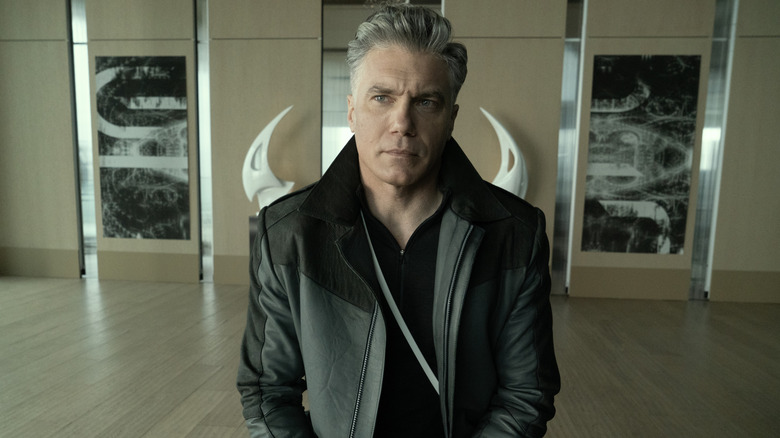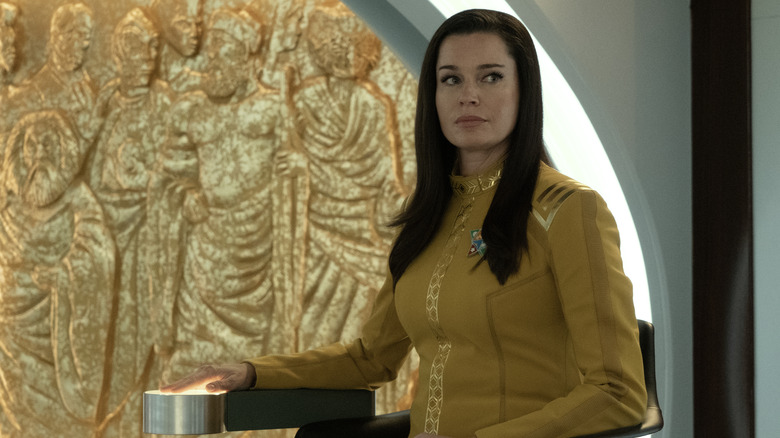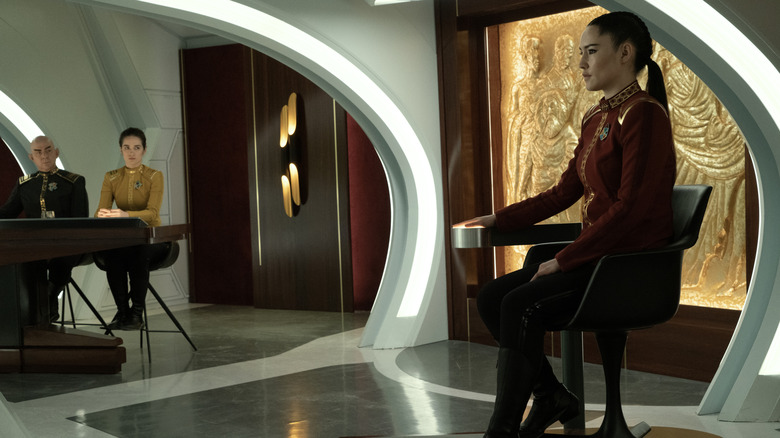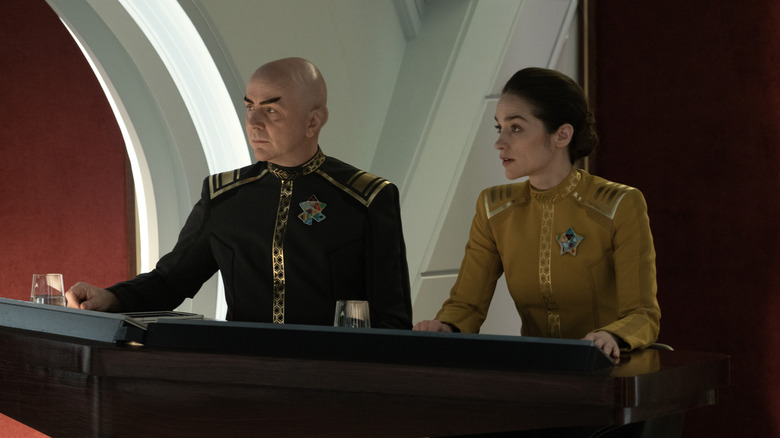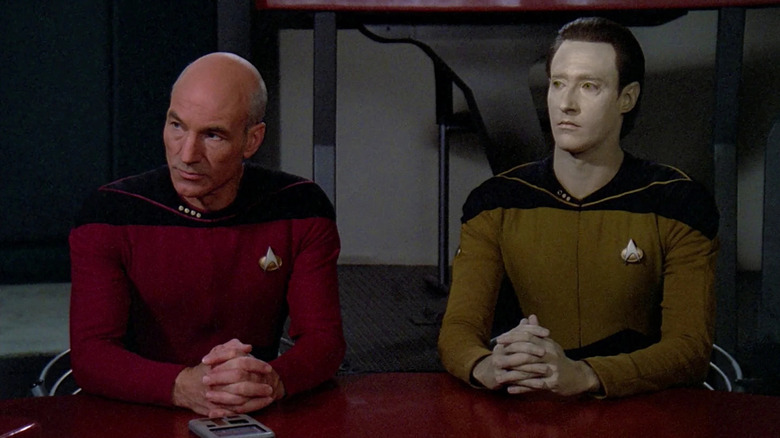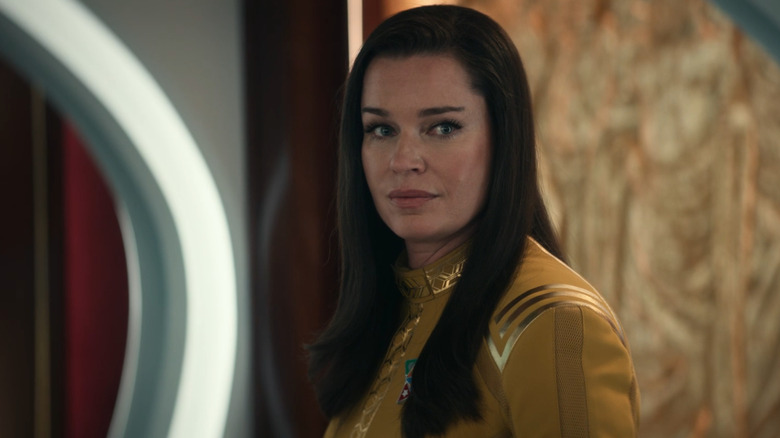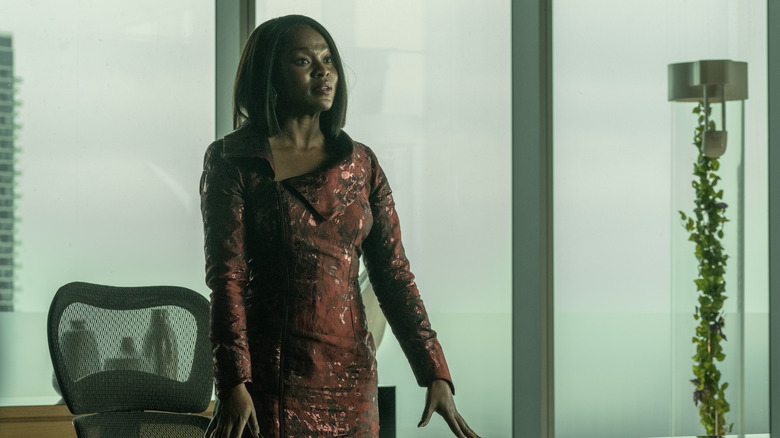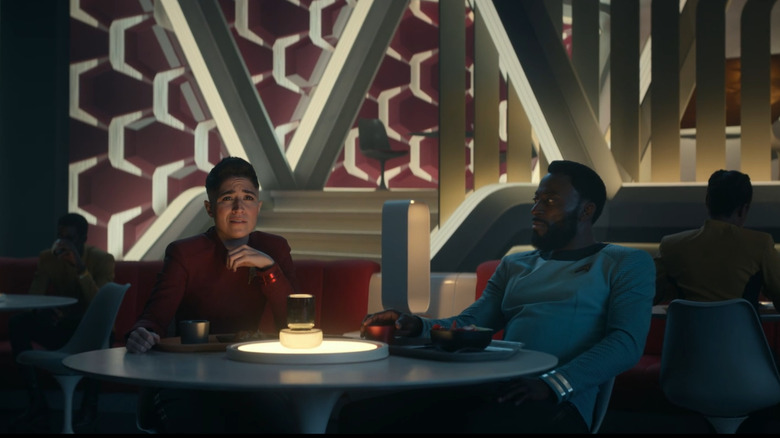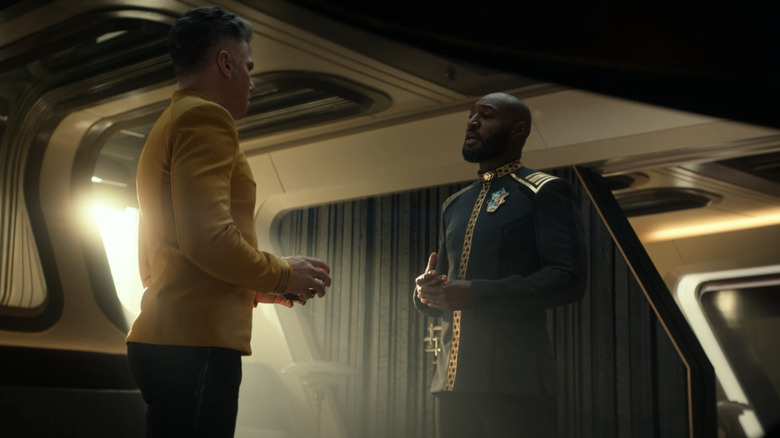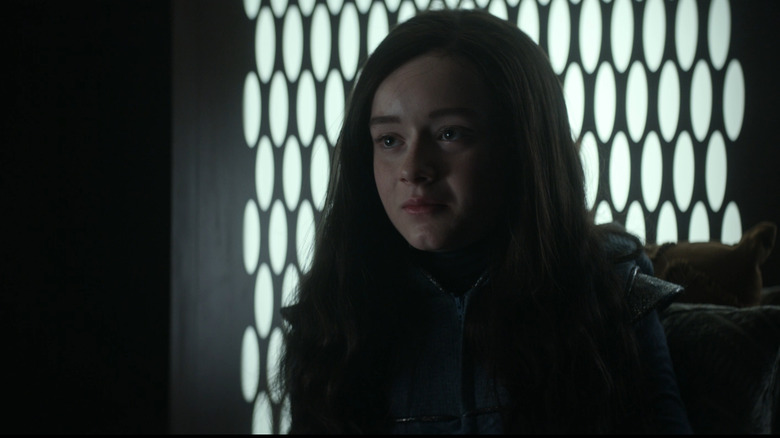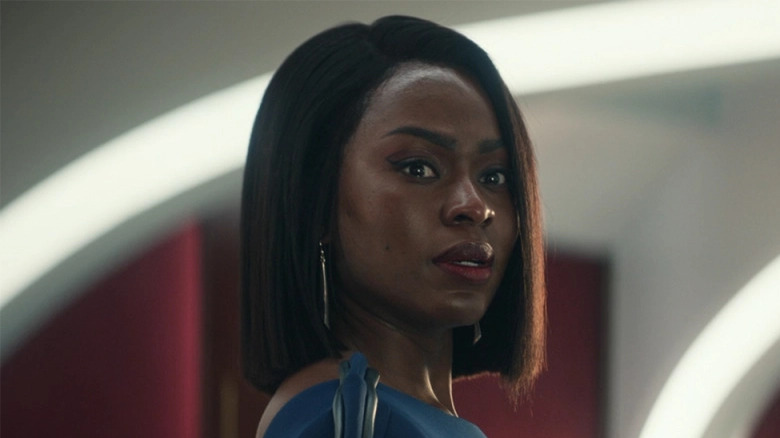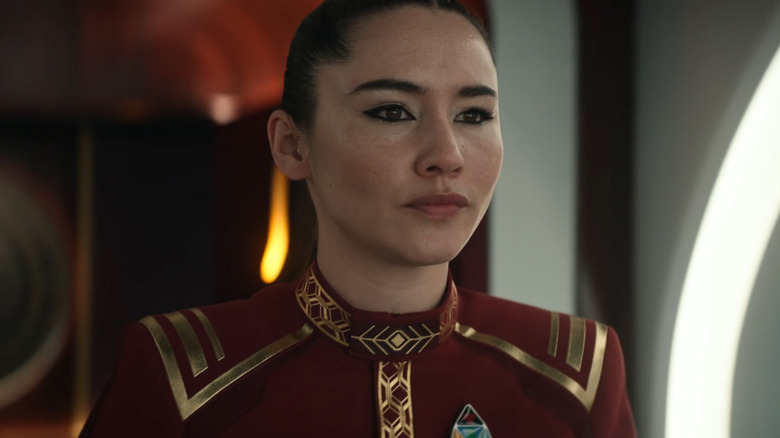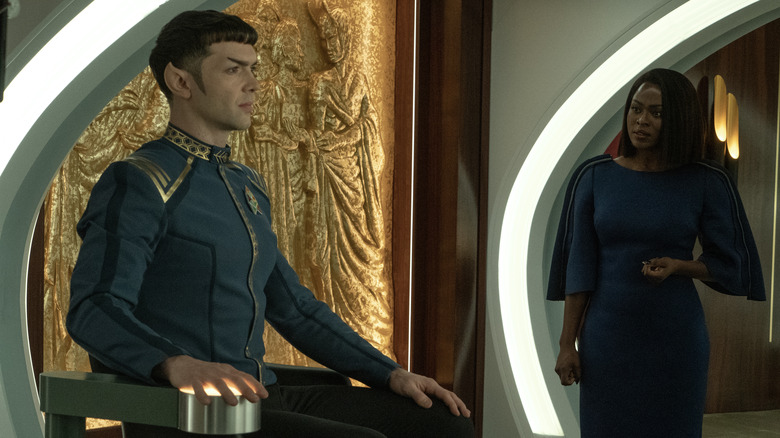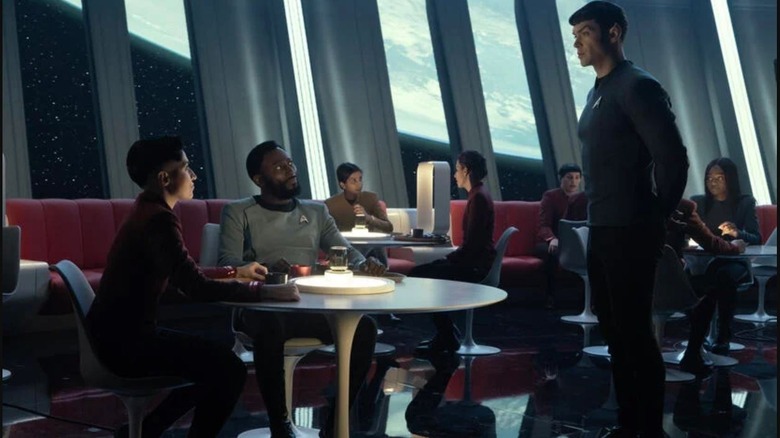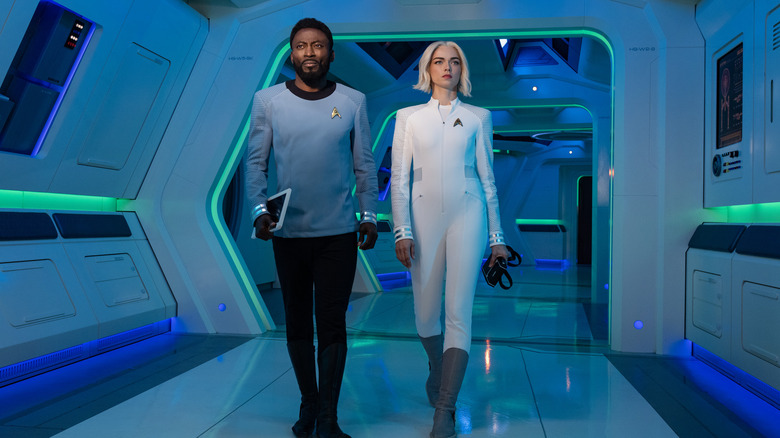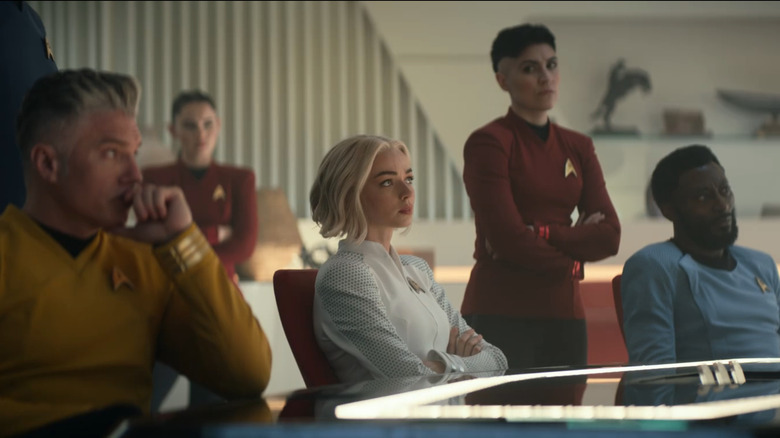Star Trek: Strange New Worlds Director On 'Ad Astra Per Aspera' And Starfleet's Fallibility [Exclusive Interview]
Joining any major franchise can be intimidating whether you're a gaffer, writer, actor, or director, but it must be especially nerve-wracking to jump into a universe as beloved and expansive as "Star Trek." Director Valerie Weiss joined the "Star Trek" extended family when she directed the recent "Strange New Worlds" season 2 episode "Ad Astra per Aspera," bringing her unique blend of experiences to the complex, layered world of "Trek." Weiss started her career in molecular pharmacology and biological chemistry, with degrees from Princeton and Harvard, before becoming a film and television director, working on shows like "Suits," "How to Get Away with Murder," and "Outer Banks."
"Ad Astra per Aspera" is a stellar "Star Trek" episode that recalls the original series and provides apt metaphors for discrimination in our own world, reminding audiences what "Star Trek" has always been about: Trying to be better, always. I had the chance to sit down via Zoom with Weiss and we talked all things "Trek," including those big metaphors, shooting on the volume, and "Star Trek" scientists.
Note: This interview has been lightly edited for clarity and brevity.
'It works on so many levels and is a really important cautionary tale'
This episode deals with a lot of different metaphors: Una's trial feels like a metaphor for racial discrimination, homophobic discrimination like "Don't Ask, Don't Tell," and also transphobia. Was it an intentional choice to be both vague and specific with the metaphors, and what do you think this episode was really about?
Thank you for leading with that. And I'll preface it with, I can't speak for the writers or the showrunners. So I'll speak from my perspective because they may have a different one, and that's I think the beauty of collaboration, right? I get a script and then I take the love and thought that they put into it, and then I interpret it and I put it out in the world. And then fans do the same thing and they say it's about trans rights or being Jewish during the Holocaust or whatever moves them, and I think that's so beautiful about getting to work in the "Star Trek" universe, which is science fiction.
It's not an actual place, but it's based in our own real human experience. By being very specific about thoughts and feelings, we can create the most universal story possible. So I don't think we ever said this is about one particular group, right? I mean, I think that there's strong comparisons to the Holocaust because I think, and maybe that's just my bias as someone who is Jewish, the writing on the wall, it's so much part of the media I grew up with and still watching an incredible show like "A Small Light," it's still reinforced in our culture. So I think there's a strong parallel to that, but I think any group that's disenfranchised and considered "other" and their rights are not being honored can absolutely relate to this.
Even cultures or groups that it hasn't gotten that far, but you feel like your rights are slipping away, like abortion being taken away from women. I think it's all very relatable to anybody who's feeling concerned about the security of their rights in the future, and I think that's what's so beautiful about it, is that it's speaking to anyone, or even people who may not feel insecure about their rights, but they care about others in their society and their rights slipping away. So that's why it was such a fulfilling, satisfying episode to do because it works on so many levels and is a really important cautionary tale.
'The most well-meaning entity still makes mistakes'
It's interesting because Starfleet is supposed to be this perfect utopian progressive ideal, but you take Starfleet to task a little bit in the episode. Can you tell me about how you made decisions around that?
I'll say before I answer it, I think the most well-meaning entity still makes mistakes, right? I remember talking to somebody about being a parent and saying, "Oh my goodness, I can't believe I do these things that I never thought I'd do as a parent" and then they said, "Well, do you apologize afterwards?" And I said, "Of course," and they said, "That's the most important thing, that your child knows you're [fallible] and that you care and there's a repair that happens." Because I think society is always going to make mistakes, and the governing body is always going to judge things wrong, because it's all in the context of when you live and what information you have. But when you're confronted with data about your behavior and how you're supposed to be and you don't change, that's the problem.
Also, if you do change and are aware, honoring the other person and making them whole is so important. I mean, that's the basis of a healthy relationship. So I think that's what's happened in this episode is that Starfleet is taken to task. I mean, Admiral April, first of all, is the one who seems most attacked, and then we learn it's really her tactic to actually be able to make a case. So it's really brilliant, such brilliant writing by Dana Horgan and the whole development of the episode by Akiva Goldsman and Henry Alonso Myers is just phenomenal. But I think showing the fallibility of an organization that means well is just as important as showing them acting honorably, because that is what it is to be human. We're not perfect, but when we know that we need to change and we do, that is who we want to aspire to and that is who we admire, and that is Starfleet.
'They're speaking my language'
I'm curious, what is your "Star Trek" history? Are you a lifelong Trekkie or is this new for you?
It's pretty new for me, to be honest. So my friend and collaborator, Benji Bakshi, who's the cinematographer on season 2 alternate episodes, we had done two TV shows together, and he called me up when he got the job and said, "They're looking for directors, you'd be perfect. Are you interested?" And I said, "I'm so interested." I said, "I don't have a ton of familiarity with the franchise, but I'll dive in," but this is exactly the kind of thing I've wanted to do, especially as a scientist. The reason I got into science was curiosity and wanting to know how the world works. And the reason I left bench science was because I had something to say and wanted to reach a bigger platform.
So watching the original series, which I knew this was based on, and seeing how much it's so purely about the exchange of ideas and ethics and morality, I was like, "They're speaking my language," and I was so excited to dive in. Then finding out that I had a court martial episode was just the answer to my prayers. I mean, it's just exactly the perfect thing that I would like to do as a vehicle to have a message, but not be message-driven, right? And tell a story through characters and emotions and relationships. But at the end of the day, there's something to attach to and you feel better for having watched it.
A wealth of 'Trek' inspiration
Were there any old "Star Trek" courtroom episodes or even some movies that you went back to specifically in reference for this?
Yeah, for sure. I watched "Measure of a Man" for sure, and "The Menagerie," and I think I watched "Court Martial." And I did watch the movie "The Wrath of Khan" because of La'an's story, I wanted to understand that. I know I watched other episodes as well, and I watched all of season 1 of "Strange New Worlds." We actually — fun fact — our old neighbor, he just passed away, sadly, but Michael J. Pollard, he was Oscar nominated for "Bonnie and Clyde," but he was in the original series, an episode called "Miri." So I remember watching that with my family because he was a good friend of ours.
Did you watch any other courtroom things, any dramas or TV shows?
I actually had directed a lot of courtroom shows. I did three episodes of "Suits" early in my career. I did "How To Get Away With Murder" and my husband used to be a lawyer, so I was very familiar with the genre. I may have watched "A Few Good Men," the famous courtroom scene.
'It's all about subtext'
You have a PhD and a degree in molecular biology. How did that impact how you approached this episode and the world of "Star Trek"?
Everyone always assumes that science is so different than being a director, but honestly for me, it's all about what's the truth, right? Science, it's I'm trying to find the truth of what exists, and as a director, I'm trying to find emotional truth. What is this character really feeling? I know it says this on the page, but what's the subtext? Because it's all about subtext. It doesn't matter what their dialogue is, it's often the subtext is at odds with that. So I have to be a detective to figure out what that is, first of all. And then the other part of finding the truth is directing an actor to really be so truthful, and there is not a false microsecond in this episode. The acting and performances are off the charts, and every single member of this cast was phenomenal and truthful and cared and went so deep. It was just one of the most gratifying experiences to tell this story with this incredible group of actors.
Directing actors like conducting a symphony
Did you have any big tips or notes, especially for Yetide Badaki, who plays Neera? Because her performance is just out of this world. I was curious if you had any little notes about her attitude, because she seems smug at first, but then we realize she's earned it.
Yeah, I mean, she's phenomenal, she's so talented and all the praise and the forecasting of an Emmy for her and for Rebecca [Romijn, who plays Una] I think is right on the money. They deserve it, and they're so tremendously talented. So anything I added to that really was about finding the layers and levels for where Neera came from and where she's going. Finding and calibrating that strength and how aggressive and strong is she out of the gate versus the build to it, because you don't want her just to be all bite. The vulnerability underneath is why it's interesting. So mining the backstory of this relationship of these two young girls who, in a very fraught, dangerous, confusing time, not only are trying to navigate girlhood, but survival, and then add to it ripping them apart and navigating the very confusing, challenging waters of a broken friendship, that's very traumatic for these characters.
So really making sure that was the foundation and then building her strength and conviction and integrity on top of that so we could always access that whenever we needed to in every scene. She's such a beautiful, open-hearted person. The vulnerability was not at all an issue, it's right there when you know her. Just really being a helpful director to say, almost like a conductor of a symphony, "Let's dial up more of this. We need the violins over here, let's play these notes." Just really conducting the instrument that she is, she's just so fantastic.
A real-life holodeck of sorts
More on a technical note about the filming of the show, I was curious about the Enterprise itself. I know is probably some sets, but then I know there's also some scenes in the Volume, and I was wondering how much is the Volume, how much is sets and how you put those two together?
We actually also shot on location as well. So the Illyrian Colony, when Pike goes to visit Neera to solicit her help, is a location in Toronto. And then everything's a set except for the mess hall. That's on the Volume, and it's so much fun to shoot on the Volume. It's just you can do anything there, obviously. And it's also, you can work so much faster there because you're lighting basically from the walls, and so you don't have a lot of practical lights getting in the way of shots. So it's a very exciting process to work in the Volume.
So the Volume's like the holodeck, but for real.
Exactly. And then the courtroom, I think people know by now that, I think it was the "Discovery" set. So Jonathan Lee, our brilliant production designer, converted that to be our courtroom. And I think there's something in the Ready Room, there's a really great interview with him talking about how he did that and the choices he made for the gold relief background, and it's a lovely, lovely set.
Using light to signal hope
As far as lighting in the episode, there is a lot of gold, not only in just the gold leaf, but the dress uniforms have a ton of gold. I was wondering if you had to be careful not to get too many lens flares, not to get quite too Kelvin-verse with the light reflections.
I don't remember it being an issue. Really, the way we wanted to play with light was — one very intentional place we used it was having the sunset during the trial and it actually sets on Pike's face. We shot it so it sets on Una and also Pike. And editorially, I'm not sure of the order of how it happens, but it was a really important moment for us where we go from hopeful and utopian and things will turn out well to, Oh god, maybe they're not going to turn out well. So that was a very, very specific choice that we rehearsed and practiced with our gaffer and worked on that, was very intentional.
Then in Pike's Quarters, when Admiral April comes and there's the beautiful light streaming through, we really used it as a way to show the optimism of characters. Like for instance, Pike really thinks he's going to be able to get Admiral April on his side there, right? So showing that hope through the sunlight that streams through as in contrast to when things seem more dire, like, Oh no, dark day of the soul, how are we going to get out of this? was how we really thought about our lighting in this episode.
'Once I really see the actors make it their own, I know we have something really special'
What's it like directing a "Star Trek" episode compared to an episode of another series?
First of all, it's so thrilling and so fun. The thought that when you do it, you're going to have people from all over the world, all different cultures and countries and ages, all with some deep, deep attachment to the series watching it is incredibly thrilling as a filmmaker and an artist. To know that your work is going to be seen and appreciated, there's nothing like that. In terms of the process, I don't think it's really that different as a director. I do the same thing on every show. I come in, I get the text, the script, and I do my work, my analysis of theme and character arcs and what's this about and world building if that's an element of it, and I just go to work. And then I bring in my collaborators and say, "This is my vision for it. How do we do it? What can you bring to that and how do you make it better?"
Same thing with the actors. And the magic really starts once I get to start rehearsing with the actors, whether it's ahead of time, like it was on this show, which was such a gift, or even the day of the shoot, it really comes to life. Because at the end of the day, the actors are who we're watching. The set could be incredible, but if you don't have great performances, it's very hard to attach emotionally. So once I really see the actors make it their own, I know we have something really special.
'Both Akiva and Henry reached out to me'
Earlier you mentioned that you do have a background directing shows with courtroom scenes, and your husband used to be a lawyer. "Star Trek" has a very storied history of great courtroom episodes, and this one's among them. So I was curious what it was like to be selected for something so traditional for this show and what you tried to do to make it special just for "Strange New Worlds."
When I found out this was the episode that I was handpicked for — because when you do this show, they're basically casting directors [like they would actors] — I was so honored. I mean, it was exciting enough to be offered an episode of "Star Trek: Strange New Worlds," but then to get to do such an important episode that I know meant the world to the showrunners, to be trusted with that just felt incredible. The other thing that I loved about this show is the unshakable belief and support of our producers in me was phenomenal. I mean, they just believed in everything I did. They were available if I had a question. Something that I really appreciate is both Akiva and Henry reached out to me. I had a really nice conversation with Akiva after a production meeting where he told me what was really personal about this episode for him.
I really tried to take that and infuse the episode with the heart and soul that he shared with me. Same with Henry. We had dinner my first night in Toronto, and he told me the whole history of them coming up with this episode and all the different thoughts and conversations they had in the writers' room about where to take it. And as a director, I can do such a better job for my showrunners and my producers if I know all of that. So for them to take the time to share in such an open-hearted way, I think you feel it and see it on the screen that they armed me with all of that insight.
'We did this for every character'
I think what's been fun to read in the reviews is that even though it's a talky episode, there's so much momentum and it's so propulsive, and getting to work with Benji for the third time, coming into a relationship where we already know each other really well and we know how we work, we know each of each other's skills and talents, Benji's a really story-driven DP, and so he was excited to really understand how I saw this episode from a thematic perspective, from a character arc perspective. So we designed our whole cinematic language. We had a very specific cinematic language. If you go back and watch it, after knowing some of this, you'll start to see these rules that we created for ourselves about when the camera moves with a character or not.
Like for instance, Batel is struggling with duty versus love, right? She loves Pike. She would much rather not be involved, and she would love to just have Una be pronounced innocent and have this all go away, but she's got duty. She's got a very serious career trajectory and she's not going to sacrifice that. So we wanted to play with that arc for her because she starts, she's all about duty, and by the end, she gets to be filled with love. So we played with, when she's feeling duty, we gave her clean camera frames. She was separated from people. She didn't share the frame with anybody because it was all on her, right? And she feels like not part of a family. And then versus love, as she starts to be able to realize her goal, she starts to share her frames again. That was an arc that was very important to us.
I'll give you one more for La'an. It was betrayal versus forgiveness. So she was so worried about having betrayed Una that it made her stiff and tight and make bad decisions, like asking Uhura to do something she shouldn't be asking her to do. And then finally, when Neera gave her the gift of forgiveness, things changed for her. So we wanted to play with that visually as well. And so with betrayal, we always had a stiff camera. The camera wasn't moving when we would shoot her in that capacity, and we always shot her long lens and further back. And then with forgiveness, we would use a wider lens closer on her. It was a more open experience in the frame. She could breathe, she could relax.
We did this for every character, and these are just I think some of the rules that you feel throughout the show, and particularly in the courtroom, that make it feel intentional and dynamic in a subliminal way so it doesn't just feel like shot, reverse shot, medium, medium, closeup, closeup, that it's just hosing it down. There was nothing that wasn't super thoughtful and intentional in the entire making of this episode.
The power of utopian fiction
So "Star Trek," as we've discussed, has this amazing capability for allegory and metaphor. And I was wondering what you think it is about "Star Trek" in particular, even among sci-fi, that makes it such a fertile playing ground for that?
Yeah, I think it's such a utopian sci-fi, and I think that's it. I do this fundraising for the World Wildlife Fund, they do a panda paddle every year and we're the winning team. And I just did a coffee chat for that yesterday and the host had said, "Valerie, what's your advice? There's people who want to stop climate change or even do a PhD. It seems like so much to bite off, so much to be able to tackle that a lot of people never start." I think the world is always going to have fixing that it needs, like we fix one thing and something else gets broken. That's just the nature of a dynamic system.
It's a lot easier to get up the energy to do it with an optimistic utopian outlook and a belief that even if we don't win the fight, it was still a fight worth fighting, but we have to believe we're going to win it. There's no reason to not believe it until it's over. And I think it's seductive and it's what a lot of people need to see, and it comes by it so honestly and authentically because these are intelligent, responsible characters. They're not taking the challenges lightly, but they're also not going to run from them. I think that's why this is such a special series.
'People need something to believe in'
"Star Trek" is back in a major way. It's always been around since the '60s, but right now, we have "Strange New Worlds," "Picard" season 3 just ended and people were really happy with it, and then we've got "Lower Decks," which is a whole new kind of thing. It feels like the golden age of "Star Trek" like it did in the '90s again. I was wondering if you knew, maybe, or had a guess as to why "Star Trek" has made such a comeback right now.
I think people need something to believe in. I think with the Internet and the connectivity that brings, but also the availability of information and data and facts, it's a lot for a lot of people to handle. It comes with a lot of downsides as much as there's so much positivity to it. I don't think people's brains are meant to get all that information all the time about things that are not in their direct experience, and I think it can be very hard on people psychologically and spiritually. Yet, because it is the golden age of knowledge, I don't know that people use religion like they may have in the past for a comfort. So they're looking for something to be able to let them know everything's okay, or to even just sort out the inputs, the moral, ethical, intellectual ideas that are coming in and find categories for them about how to think and how to feel about it.
I think storytelling in general is incredibly important for that, but a kind of storytelling that, like we started with this interview, transcends a culture, a geography, an age, a type of person, makes you feel really good and really safe to let that be a guide for how you think and feel. And so I think more than ever, people need something like that and they respect the integrity with which these stories are being told and that they're not propaganda and they're not just trying to shove ideas down your throat, but they're really thoughtful arguments and debates within an episode.
'It's always hard to represent a scientist, right?'
Who's your favorite "Star Trek" character?
I feel like if I picked from "Strange New Worlds," I'd have a real problem when I go back because they'd be like –
It's like picking between your favorite kids, so let's just say "Star Trek" in general.
Yeah, I mean, I love Data. I think Data is so cool. And "Measure of a Man" made me cry. And I just found out a friend, her distant cousin is Data, the actor who played Data. So I was like, "Please tell him about our episode." But yeah, I think that episode and that actor [Brent Spiner] are really, really special.
As a scientist, how do you feel about how "Star Trek" represents scientists in general? Because there's a lot of them in all the different series and they are major characters.
Spock, I love, love, love him. And I love — I think Ethan [Peck] is the greatest and does such justice to such an iconic role. And M'Benga and Nurse Chapel are amazing scientists on this incarnation of "Star Trek," and I really love how they're represented in this series, for sure. I mean, it's always hard to represent a scientist, right? Because at the end, we are just human like anybody else and they often are stereotyped, but I think the more well-rounded you can make a scientist, the better, because I think the definition of a scientist is someone who's paying attention and someone who's observing the world they're in, and you can't stop their curiosity.
A perfect starting point
I love that. To wrap up, is there anything you want the /Film audience to know? All the Trekkies out there?
I would just say, I think this is a really exciting episode because a lot of my friends have been asking and who aren't familiar with this series, and I'm like, "This is an amazing episode to get started on 'Star Trek' with. I think you don't need to know very much at all to be able to jump in and understand it and enjoy it." So I would say to the Trekkies, tell 10 friends who aren't Trekkies to come over and watch it with you because I think it's a incredible series. And the more people who are having the same debate, the better it is for society. The more people who are watching the same content, thoughtful content, and talking about it and having discourse, that's a great thing for our society.
New episodes of "Star Trek: Strange New Worlds" premiere Thursdays on Paramount+.
